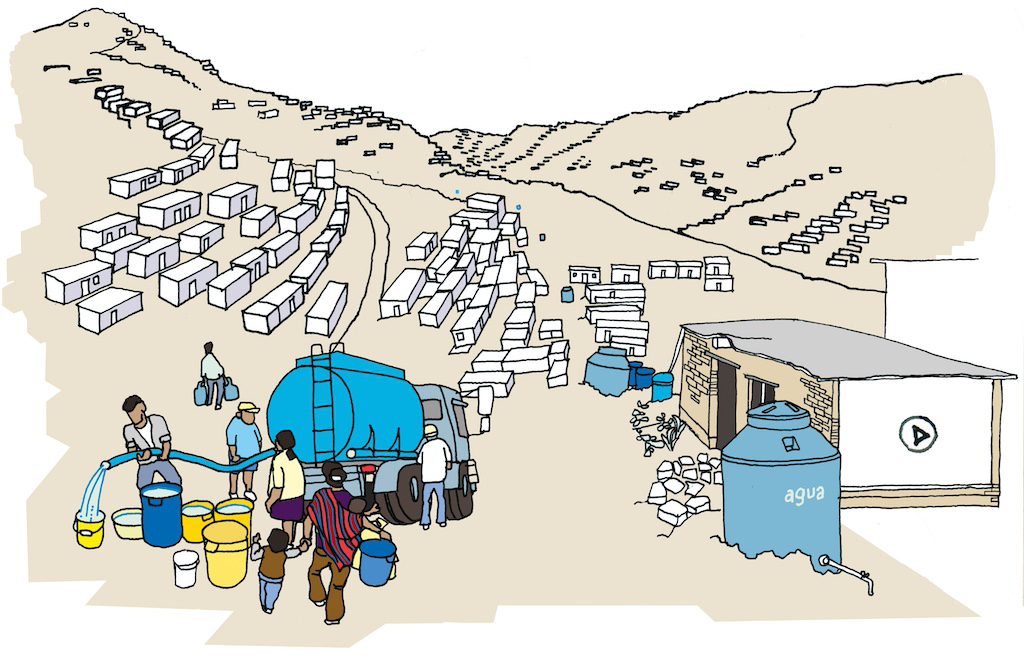Between October 8 and 11, 2024, the International Congress “100 Años de Barriadas (100 years of slums): Changes, Persistencies, and Futures of Urbanization in Peru” was held at the Pontifical Catholic University of Peru (PUCP) in Lima. Organized by the PUCP Faculty of Architecture and Urbanism, the Centre for Research on Architecture and the City (CIAC), the Urbanism, Governance and Social Housing Research Group (CONURB) and the Twillinger Center for Housing Innovation of Habitat for Humanity, the congress brought together professionals and experts from across Latin America, including participants from Argentina, Brazil, Bolivia, and Peru, such as Lorena Zárate, Raquel Rolnik, Juan Cabrera, and Gustavo Riofrío, as well as activists, community leaders, public officials, and others.
The event was significant because, over the past century, Peruvian cities have developed unique urban models with distinct approaches to occupation, construction, and habitation. Initially termed “barriada” (slum) and later known as “informal settlement” or “popular neighborhood,” this model has evolved alongside Peru’s shifting political and ideological landscape, seen in urban policies that have moved from initial indifference to criminalization and, in some cases, land trafficking. Over time, these neighborhoods have fostered social organization, self-management, and self-construction practices, while also facing challenges such as clientelism and stigmatization. This phenomenon, documented since 1924, persists in precarious conditions that urgently demand improved urban quality of life in Peru.
During the panel “Inequalities, Vulnerabilities, and Urban Development,” the SMUS-funded MOOC “Informal Settlements in Lima: Corruption, Integrity, and Access to Water and Sanitation” was presented. This Massive Open Online Course, launched in August 2024, has been developed by the Water Integrity Network (WIN) in Berlin, the Center for Research in Urban and Territorial Theory (UrbesLab) in Lima; and the PUCP. The presentation provided an overview of the course, introducing the concepts of corruption, integrity, and integrity failures. Additionally, the methods used in creating the course and the scales it covers—from the city to the neighborhood and down to household —were discussed, showing how integrity failures affect both supply and access to water and sanitation, involving diverse stakeholders from the public and private sectors as well as residents of human settlements. Following the MOOC presentation, there was a Q&A session with the audience and a discussion among panelists, moderated by Prof. Dr. Pablo Vega Centeno. Finally, the attendees were invited to take the course, which is free of charge, asynchronous and available on the Cap-Net platform.
The congress concluded successfully, with Urban Sociologist Diana Torres from UrbesLab, a member of this MOOC team, contributing to the closing roundtable discussion. Events like this are vital spaces for reflection and discussion, providing an opportunity to assess how cities in Peru have developed over the decades, particularly considering ongoing issues of inequality and vulnerability, such as access to water and sanitation and corruption. This congress also offered a chance to evaluate the role of the state, public policy, urban planners, and private and community actors over the years. Finally, looking at the past and present of barriadas helps to propose solutions for the future that can transform these neighborhoods into areas of opportunity and inclusion, improving quality of life and reducing urban precariousness in Peru.
Text: M.Sc in Urban Management Alhelí Zanella
Watch the MOOC trailer and access the course here








